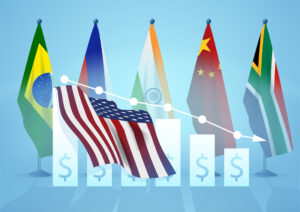
5 Reasons BRICS Is a Game-Changer for World Finance
From Infrastructure to De-Dollarization – BRICS Sets the Pace across the Globe
A New Era in Global Finance Is Emerging
As the world’s economic balance of power evolves, the five leading emerging markets known as the BRICS — Brazil, Russia, India, China, and South Africa — are gaining unprecedented influence in global finance. Long seen as supporting actors on the international stage, these countries are now increasingly shaping the rules of international economics.
With their own development bank, shared currency initiatives, and strategic investments in green and digital sectors, BRICS represents a bold declaration: the era of Western financial hegemony is being fundamentally challenged.
This transformation has broad and lasting implications. For countries, it provides alternative financing and new paths to economic cooperation. For investors, it offers rare opportunities in high-growth, underserved markets. And for global policymakers, it calls for urgent reform and adaptation.
This article dives deep into why BRICS is not just a coalition of emerging nations — but a serious contender in reshaping world finance. Let’s explore the key reasons behind its growing power.

BRICS Now Has Its Own Development Bank:
The New Development Bank (NDB), created as a BRICS initiative, is channeling capital into infrastructure and sustainable development projects across the Global South.Unlike conventional organizations like the IMF, the NDB avoids imposing strict austerity conditions on its loans. This makes it a far more attractive option for developing nations looking to fund growth without the heavy political and social costs usually tied to Western lending institutions.
BRICS Is Already Working on the Creation of a New Reserve Currency:
To reduce reliance on the US dollar, BRICS is reportedly developing a common currency, backed by a basket of member nations’ currencies.This initiative could revolutionize how international trade is conducted, especially among developing countries. By facilitating trade settlements outside the dollar system, BRICS seeks to create a more stable and balanced financial environment — less prone to the political and economic volatility often associated with dollar-dominated transactions.
Big on Green and Tech Projects:
The BRICS countries are making massive investments in green energy, digital infrastructure, and fintech innovations.
These areas are not only vital for economic sustainability but also represent high-growth sectors for international investors. Underdeveloped regions within BRICS offer substantial upside for those willing to bet early on clean tech, digital banking, and blockchain ecosystems.
Expansion Is on the Horizon:
BRICS is no longer a closed club. Countries like Saudi Arabia, Argentina, and Egypt have already signed up for observer status, with many others expressing interest in full membership.This expansion would dramatically increase the bloc’s economic and political influence — potentially putting it on par with the G7. A larger BRICS coalition could lead to stronger regional alliances, more robust cross-border investments, and a shift in the geopolitical status quo.
Managing Risks: What Admirers of BRICS Must Look Out For
Two Hurdles That Could Hamper BRICS’ Financial Aspirations
Internal Political and Economic Disparities:BRICS may be a unified bloc, but its members are far from homogenous. Each country has its own political system, economic model, and set of national interests. This diversity can often result in slower decision-making or diluted collective actions.
However, it also encourages innovation through negotiation and forces the kind of multipolar diplomacy that modern finance increasingly values. Instead of being a flaw, this diversity may be a hidden strength in a world that is rapidly moving toward decentralized financial systems.
Inadequate Exposure of Institutions Compared to the West:Institutions like the NDB are still relatively young when compared to giants like the World Bank or the IMF. They lack the deep-rooted networks, influence, and institutional maturity of their Western counterparts.
Yet this “newness” allows BRICS institutions to be more flexible, digital-first, and less bureaucratic — essential qualities in an age of rapid financial transformation. Their agility could turn out to be their most important advantage as the world transitions into a new economic order.
Why BRICS Can’t Be Ignored
BRICS is no longer a fringe coalition — it’s a serious force shaping the future of global finance. Through strategic initiatives such as a shared reserve currency, a dedicated development bank, and forward-looking investments in technology and green energy, BRICS is building the foundation for a more inclusive and balanced global economy.
While challenges remain — from internal disparities to institutional growing pains — the momentum is undeniable. As the global financial narrative shifts, ignoring BRICS is no longer an option. For investors, policymakers, and financial analysts alike, staying informed on BRICS isn’t just smart — it’s necessary.
Our Post


From Paycheck to Prosperity: The Ultimate Blueprint for Sustainable Wealth Building
